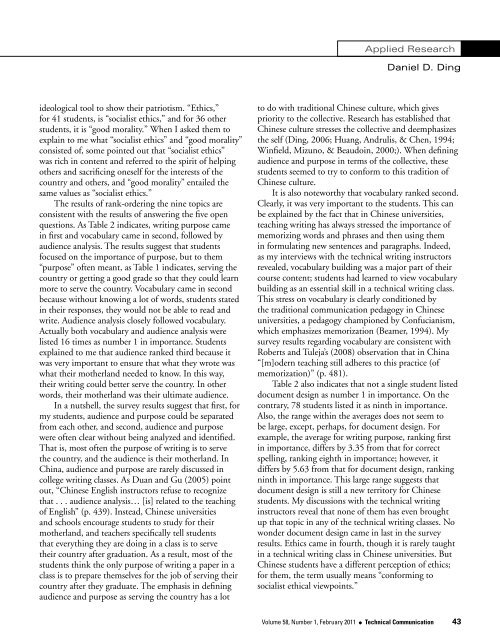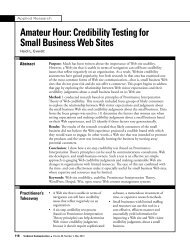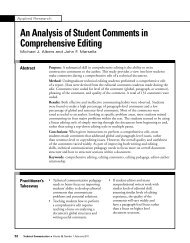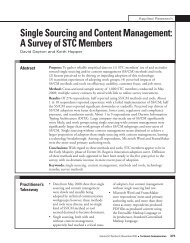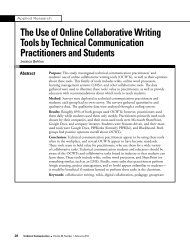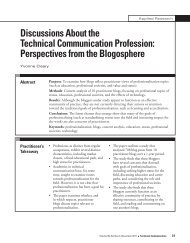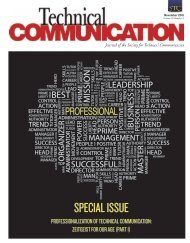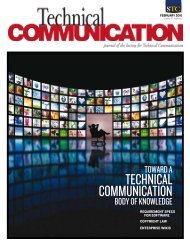When Traditional Chinese Culture Meets a Technical ...
When Traditional Chinese Culture Meets a Technical ...
When Traditional Chinese Culture Meets a Technical ...
Create successful ePaper yourself
Turn your PDF publications into a flip-book with our unique Google optimized e-Paper software.
Applied ResearchDaniel D. Dingideological tool to show their patriotism. “Ethics,”for 41 students, is “socialist ethics,” and for 36 otherstudents, it is “good morality.” <strong>When</strong> I asked them toexplain to me what “socialist ethics” and “good morality”consisted of, some pointed out that “socialist ethics”was rich in content and referred to the spirit of helpingothers and sacrificing oneself for the interests of thecountry and others, and “good morality” entailed thesame values as “socialist ethics.”The results of rank-ordering the nine topics areconsistent with the results of answering the five openquestions. As Table 2 indicates, writing purpose camein first and vocabulary came in second, followed byaudience analysis. The results suggest that studentsfocused on the importance of purpose, but to them“purpose” often meant, as Table 1 indicates, serving thecountry or getting a good grade so that they could learnmore to serve the country. Vocabulary came in secondbecause without knowing a lot of words, students statedin their responses, they would not be able to read andwrite. Audience analysis closely followed vocabulary.Actually both vocabulary and audience analysis werelisted 16 times as number 1 in importance. Studentsexplained to me that audience ranked third because itwas very important to ensure that what they wrote waswhat their motherland needed to know. In this way,their writing could better serve the country. In otherwords, their motherland was their ultimate audience.In a nutshell, the survey results suggest that first, formy students, audience and purpose could be separatedfrom each other, and second, audience and purposewere often clear without being analyzed and identified.That is, most often the purpose of writing is to servethe country, and the audience is their motherland. InChina, audience and purpose are rarely discussed incollege writing classes. As Duan and Gu (2005) pointout, “<strong>Chinese</strong> English instructors refuse to recognizethat . . . audience analysis… [is] related to the teachingof English” (p. 439). Instead, <strong>Chinese</strong> universitiesand schools encourage students to study for theirmotherland, and teachers specifically tell studentsthat everything they are doing in a class is to servetheir country after graduation. As a result, most of thestudents think the only purpose of writing a paper in aclass is to prepare themselves for the job of serving theircountry after they graduate. The emphasis in definingaudience and purpose as serving the country has a lotto do with traditional <strong>Chinese</strong> culture, which givespriority to the collective. Research has established that<strong>Chinese</strong> culture stresses the collective and deemphasizesthe self (Ding, 2006; Huang, Andrulis, & Chen, 1994;Winfield, Mizuno, & Beaudoin, 2000;). <strong>When</strong> definingaudience and purpose in terms of the collective, thesestudents seemed to try to conform to this tradition of<strong>Chinese</strong> culture.It is also noteworthy that vocabulary ranked second.Clearly, it was very important to the students. This canbe explained by the fact that in <strong>Chinese</strong> universities,teaching writing has always stressed the importance ofmemorizing words and phrases and then using themin formulating new sentences and paragraphs. Indeed,as my interviews with the technical writing instructorsrevealed, vocabulary building was a major part of theircourse content; students had learned to view vocabularybuilding as an essential skill in a technical writing class.This stress on vocabulary is clearly conditioned bythe traditional communication pedagogy in <strong>Chinese</strong>universities, a pedagogy championed by Confucianism,which emphasizes memorization (Beamer, 1994). Mysurvey results regarding vocabulary are consistent withRoberts and Tuleja’s (2008) observation that in China“[m]odern teaching still adheres to this practice (ofmemorization)” (p. 481).Table 2 also indicates that not a single student listeddocument design as number 1 in importance. On thecontrary, 78 students listed it as ninth in importance.Also, the range within the averages does not seem tobe large, except, perhaps, for document design. Forexample, the average for writing purpose, ranking firstin importance, differs by 3.35 from that for correctspelling, ranking eighth in importance; however, itdiffers by 5.63 from that for document design, rankingninth in importance. This large range suggests thatdocument design is still a new territory for <strong>Chinese</strong>students. My discussions with the technical writinginstructors reveal that none of them has even broughtup that topic in any of the technical writing classes. Nowonder document design came in last in the surveyresults. Ethics came in fourth, though it is rarely taughtin a technical writing class in <strong>Chinese</strong> universities. But<strong>Chinese</strong> students have a different perception of ethics;for them, the term usually means “conforming tosocialist ethical viewpoints.”Volume 58, Number 1, February 2011 l <strong>Technical</strong> Communication 43


